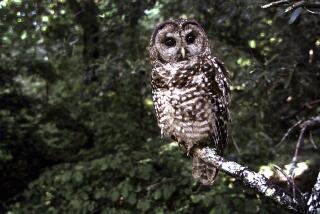It’s Not the Owl That Made Happy Camp Sad
- Share via
The people of Happy Camp may believe that they are being killed by owls, “Spooked by an Owl, Town Fights Its Future” (April 23), but in truth the economic problems of their town did not arise because the spotted owl habitually roosts in the snags of the Pacific Northwest. Their troubles result from having looked upon the federal timberlands as inexhaustible--a great bonanza that would continue to provide riches for the indefinite future. But now the forests, like the gold mines of Happy Camp, are giving out.
The Forest Service is to be blamed, not for the slowing down of timber sales, which is inevitable, but more for encouraging the timber dependence of communities such as Happy Camp--building roads into the forests at taxpayer expense, selling timber below marketing costs and in other ways promoting over-cutting of timber.
The owl controversy has merely given publicity to a disastrous policy of long standing. The owls’ and other cavity-nesting species’ need for undisturbed forest areas has focused attention on the harvesting methods advocated by the Forest Service, such as clear-cutting and shelterwood cutting, in which large openings are created and the attempt is then made to regenerate the forest into “even-aged” timber stands. Such stands will not provide satisfactory habitat for creatures adapted to life in a primeval forest for several hundred years, if ever.
Today, only about 5% or less of the tremendous stretches of old-growth forests that once blanketed the Pacific Northwest still remain uncut. The preservation of at least a portion of these forests must be made a national priority. Legislation recently introduced in Congress seeks to establish a national ancient forest reserve system, setting aside large tracts of old-growth forest in which logging and road building would be prohibited.
The ancient forest issue is not a contest between people and owls. The old-growth forests provide habitat for many other rare, threatened and endangered species of plants, fish, animals and birds. Moreover, the human benefits of ancient forests, both material and spiritual, are enormous.
NELLIE D. PATTERSON
Pacific Palisades
More to Read
Sign up for The Wild
We’ll help you find the best places to hike, bike and run, as well as the perfect silent spots for meditation and yoga.
You may occasionally receive promotional content from the Los Angeles Times.






